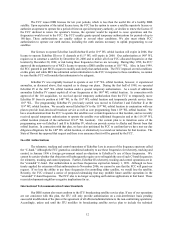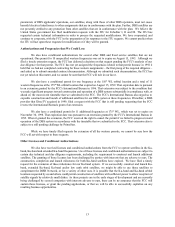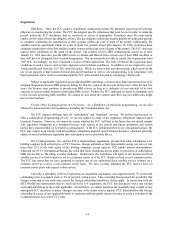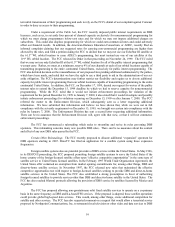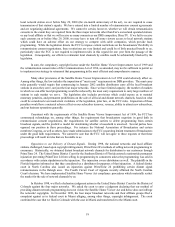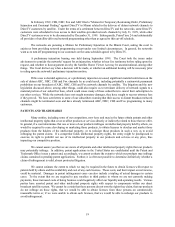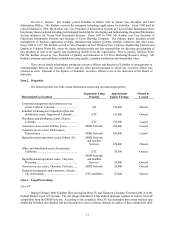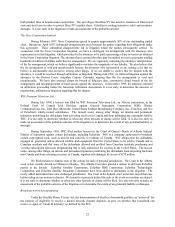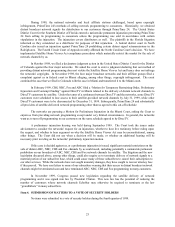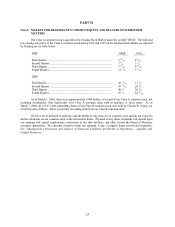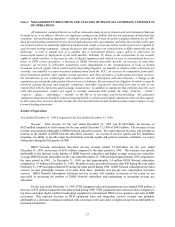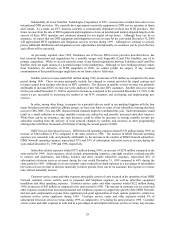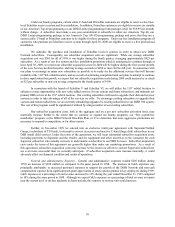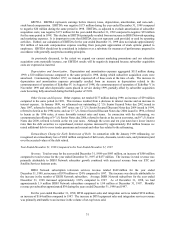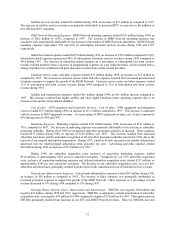Dish Network 1999 Annual Report Download - page 24
Download and view the complete annual report
Please find page 24 of the 1999 Dish Network annual report below. You can navigate through the pages in the report by either clicking on the pages listed below, or by using the keyword search tool below to find specific information within the annual report.22
both product lines in head-to-head competition. The suit alleges that DirecTV has acted in violation of federal and
state anti-trust laws in order to protect DirecTV’s market share. EchoStar is seeking injunctive relief and monetary
damages. It is too early in the litigation to make an assessment of the probable outcome.
The News Corporation Limited
During February 1997, News Corporation agreed to acquire approximately 50% of our outstanding capital
stock. During late April 1997, substantial disagreements arose between the parties regarding their obligations under
this agreement. Those substantial disagreements led to litigation which the parties subsequently settled. In
connection with the News Corporation litigation, we have a contingent fee arrangement with the attorneys who
represented us in that litigation, which provides for the attorneys to be paid a percentage of any net recovery obtained
in the News Corporation litigation. The attorneys have asserted that they may be entitled to receive payments totaling
hundreds of millions of dollars under this fee arrangement. We are vigorously contesting the attorneys’ interpretation
of the fee arrangement, which we believe significantly overstates the magnitude of our liability. We also believe that
the fee arrangement is void and unenforceable because the attorneys who represented us are seeking a fee that we
believe is unreasonable and excessive, among other things. If we are unable to resolve this fee dispute with the
attorneys, it would be resolved through arbitration or litigation. During mid-1999, we initiated litigation against the
attorneys in the District Court, Arapahoe County, Colorado, arguing that the fee arrangement is void and
unenforceable. We have also asserted claims for breach of fiduciary duty, constructive fraud, breach of the fee
arrangement, and misappropriation of trade secrets against the attorneys. In December 1999, the attorneys initiated
an arbitration proceeding before the American Arbitration Association. It is too early to determine the outcome of
negotiations, arbitration or litigation regarding this fee dispute.
WIC Premium Television Ltd.
During July 1998, a lawsuit was filed by WIC Premium Television Ltd., an Alberta corporation, in the
Federal Court of Canada Trial Division, against General Instrument Corporation, HBO, Warner
Communications, Inc., John Doe, Showtime, United States Satellite Broadcasting Company, Inc., EchoStar, and two
of EchoStar’s wholly-owned subsidiaries. The lawsuit seeks, among other things, an interim and permanent
injunction prohibiting the defendants from activating receivers in Canada and from infringing any copyrights held by
WIC. It is too early to determine whether or when any other lawsuits or claims will be filed. It is also too early to
make an assessment of the probable outcome of the litigation or to determine the extent of any potential liability or
damages.
During September 1998, WIC filed another lawsuit in the Court of Queen’s Bench of Alberta Judicial
District of Edmonton against certain defendants, including EchoStar. WIC is a company authorized to broadcast
certain copyrighted work, such as movies and concerts, to residents of Canada. WIC alleges that the defendants
engaged in, promoted, and/or allowed satellite dish equipment from the United States to be sold in Canada and to
Canadian residents and that some of the defendants allowed and profited from Canadian residents purchasing and
viewing subscription television programming that is only authorized for viewing in the United States. The lawsuit
seeks, among other things, an interim and permanent injunction prohibiting the defendants from importing hardware
into Canada and from activating receivers in Canada, together with damages in excess of $175 million.
We filed motions to dismiss each of the actions for lack of personal jurisdiction. The Court in the Alberta
court action recently denied our Motion to Dismiss. The Alberta Court also granted a motion to add more EchoStar
parties to the lawsuit. EchoStar Satellite Corporation, EchoStar DBS Corporation, EchoStar Technologies
Corporation, and EchoStar Satellite Broadcast Corporation have been added as defendants in the litigation. The
newly added defendants have also challenged jurisdiction. The Court in the Federal court action has stayed that case
before ruling on our motion to dismiss. We intend to vigorously defend the suits in the event our motions are denied.
It is too early to determine whether or when any other lawsuits or claims will be filed. It is also too early to make an
assessment of the probable outcome of the litigation or to determine the extent of any potential liability or damages.
Broadcast network programming
Under the Satellite Home Viewer Act, the determination of whether a household qualifies as “unserved” for
the purpose of eligibility to receive a distant network channel depends, in part, on whether that household can
receive a signal of “Grade B intensity” as defined by the FCC.


